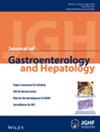Acesulfame potassium induces dysbiosis and intestinal injury with enhanced lymphocyte migration to intestinal mucosa
Abstract
Background and Aim
The artificial sweetener acesulfame potassium (ACK) is officially approved as safe for intake and has been used in processed foods. However, ACKs have been reported to induce metabolic syndrome, along with alteration of the gut microbiota in mice. In recent years, studies have suggested that this artificial sweetener promotes myeloperoxidase reactivity in Crohn's disease-like ileitis. We aimed to investigate the effect of ACK on the intestinal mucosa and gut microbiota of normal mice.
Methods
Acesulfame potassium was administered to C57BL/6J mice (8?weeks old) via free drinking. Intestinal damage was evaluated histologically, and messenger RNA (mRNA) levels of TNF-α, IFN-γ, IL1-β, MAdCAM-1, GLP1R, and GLP2R were determined with quantitative reverse transcription polymerase chain reaction (qRT-PCR). Immunohistochemistry was performed to examine the expression of MAdCAM-1 in the small intestine. The composition of gut microbiota was assessed using high-throughput sequencing. We performed intravital microscopic observation to examine if ACK altered lymphocyte migration to the intestinal microvessels.
Results
Acesulfame potassium increased the expression of proinflammatory cytokines, decreased the expression of GLP-1R and GLP-2R, and induced small intestinal injury with an increase in intestinal permeability, and ACK treatment induced microbial changes, but the transfer of feces alone from ACK mice did not reproduce intestinal damage in recipient mice. ACK treatment significantly increased the migration of lymphocytes to intestinal microvessels.
Conclusion
Acesulfame potassium induces dysbiosis and intestinal injury with enhanced lymphocyte migration to intestinal mucosa. Massive use of non-caloric artificial sweeteners may not be as safe as we think.





